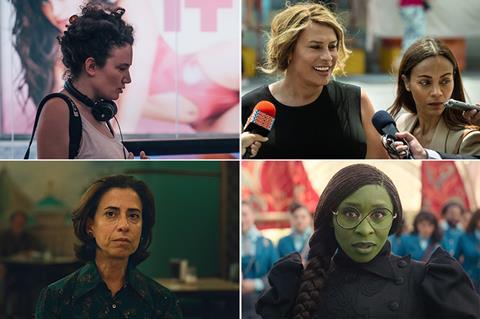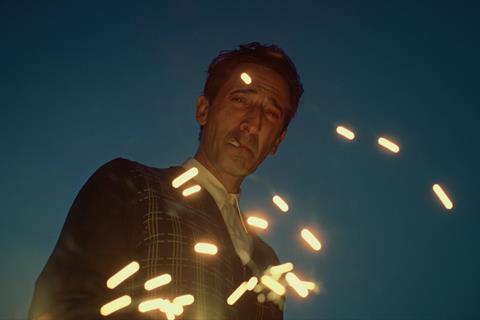
The 2025 Oscar nominations were unveiled today (January 23), with Emilia Perez leading the way with 13 nods, followed by The Brutalist and Wicked on 10 each.
Screen picks out five talking points from this year’s nominations. The Oscar ceremony will take place on March 2.
Strong showings and shut-outs
No film has had a stronger showing than Emilia Perez, France’s entry for best international feature and nominated in all the major categories for which it is eligible. Directed by French auteur Jacques Audiard and shot mostly in Spanish and mostly in France, standing in for Mexico, it is also an old-fashioned musical. Despite the Hollywood star power of Zoe Saldana and Selena Gomez and the campaigning power of US distributor Netlfix which acquired the film at Cannes, its success was never assured. Now it has 13 Oscar nominations.
Albeit in a more low-key manner, Walter Salles’ Portuguese-language Venice premiere I’m Still Here, about a real-life matriarch in military-ruled Brazil in the 1970s, has also connected with Oscar voters, garnering three key nominations. They are for best international feature, best actress for Fernanda Torres, and as one of the 10 best film nominees. (It is Bafta-nominated for film not in the English language.)
Torres is only the second Brazilian actress to receive an Oscar nomination; her mother, Fernanda Montenegro, was nominated in 1999 for Central Station, also directed by Salles (she also makes an appearance in I’m Still Here). Torres has some momentum, having nabbed the Golden Globe for best actress in a drama, the first Brazillian actress to do so, but it could be the international category where the film has its strongest chance.
Less happy with the nominations were the teams behind complete Oscar shut-outs including Ireland’s international feature entry Kneecap, which has six Bafta nominations. Rich Peppiatt’s music biopic about the politically outspoken Belfast band of the same name also missed out in the original song category for the track ‘Sick In The Head’.
Another UK-set no-show was Steve McQueen’s Blitz, which has three nods at the Baftas but none from Oscar.
The first Gladiator film won five Oscars and was nominated in 12 categories. The sequel has just one, for costume design, with surprising omissions in the VFX categories and in supporting actor for Denzel Washington.
Despite strong buzz, in Europe at least, Payal Kapadia’s All We Imagine As Light also failed to garner any nominations.
Thank goodness for Coralie, Colman and Cynthia
There is no avoiding the sheer volume of white men to have landed Oscar nominations this year. Coralie Fargeat, director of The Substance, does much of the heavy-lifting for female representation as the sole woman in the directing category. Also, out of 10 titles up for best picture, The Substance is the only film directed by a woman, down from a record-breaking three last year.
Fargeat is also one of just two women in the original screenplay category, alongside The Brutalist co-writer Mona Fastvold.
It is not much better in the adapted screenplay category, where just two out of 15 people named are women: Nickel Boys co-writer Joslyn Barnes and Lea Mysius, credited as writing Emilia Perez “in collaboration” with Audiard.
Across the four acting categories, Sing Sing star Colman Domingo and Wicked’s Cynthia Erivo are the only Black performers to receive nominations. Another bright note is the leading actress nomination for Karla Sofia Gascon, the first for an openly trans person in this category.
The craft categories are also dominated by white men, with a few exceptions including Wicked’s Paul Tazewell for costume design and Emilia Perez editor Juliette Welfling.
In visual effects, not a single woman is named among the 20 nominees across five films and just one – Nancy Nugent Title for Wicked – is among the 23 names listed in the best sound category.
All five best international feature nominees are also directed by men.
Things are slightly better in the documentary feature categories with Black Box Diaries director Shiori Ito and Sugarcane co-director Emily Kassie redressing the balance.
Festival launchpads

As at the Baftas, many of the Oscar nominees were launched at film festivals while relatively few Hollywood tentpoles made the cut. Cannes did particularly well; it launched seven of this year’s Oscar nominees including Emilia Perez, which was picked up there by Netflix, and four out of the five international feature film nominees. (The Cannes launches were Anora, The Apprentice, Emilia Perez, Flow, The Girl With The Needle, The Seed Of The Sacred Fig and The Substance.)
Venice world premieres scored 15 Oscar nominations; they include 10 nods for The Brutalist as well as three for I’m Still Here and one each for Maria and September 5.
Sundance was strong in the documentary category, with nominations for Black Box Diaries, Sugarcane, Porcelain War and Soundtrack To A Coup d’Etat as well as starting the momentum for A Real Pain.
Toronto, meanwhile, hosted three launches: Elton John: Never Too Late, Sing Sing and The Wild Robot. Telluride also hosted three world premieres of Oscar nominees (Better Man, Conclave and Nickel Boys). And it was one apiece for Annecy (Memoir Of A Snail), AFI Fest (Wallace & Gromit: Vengeance Most Fowl) and Berlin (No Other Land).
The lingering effects of the 2023 Hollywood strikes meant only three out of the 10 best film nominees were high-profile studio titles: A Complete Unknown, Dune: Part Two and Wicked.
Bafta crossover
At last year’s Oscars, the winners overlapped with the Baftas in 18 categories, and there’s plenty of crossover this time at the nominees stage.
All of the actors picked are also Bafta-nominated apart from Torres and Monica Barbaro (in supporting actress for A Complete Unknown). Four of the five directors match up, with James Mangold making the Oscars’ list, also for A Complete Unknown (his first nomination in the category and fourth overall), whereas Bafta’s six-strong category features Edward Berger for Conclave and Denis Villeneuve for Dune: Part Two.
There’s also only one difference in the screenplay categories (September 5 instead of Kneecap in original screenplay), and all the Bafta-nominated animations also make the Oscar list – plus Memoir Of A Snail for the latter.
The biggest divergence is perhaps the documentary feature category, in which only two films overlap: Black Box Diaries and No Other Land. All three different Oscar picks (Porcelain War, Soundtrack To A Coup D’etat and Sugarcane) debuted at Sundance, and show how Ampas voters tend to ignore the celebrity-based titles that Bafta voters favour, such as Will & Harper and Super/Man this time around.
Universal breaks record
For the second year in a row, Universal Pictures tops the distributors with 25 nominations – a record for the studio and an impressive jump from last year’s 18. Its nominees are led by Wicked on 10, Conclave on eight (via Focus Features), Nosferatu on four (also Focus) and The Wild Robot on three via DreamWorks Animation.
In second place once again was Netflix which picked up 16 nominations in total. The majority of those came from Emilia Perez on 13, while Maria, Wallace & Gromit: Vengeance Most Fowl and The Six Triple Eight picked up one nomination each.
It was a quieter showing for the other streamers with Amazon MGM Studios scoring two nominations for Nickel Boys, including a welcome best picture nod. After landing a record 13 nominations last year, mostly through Killers Of The Flower Moon, Apple was absent.
Disney and A24 were hot on Netflix’s tail, both scoring 14 nominations. The Brutalist was the big nominee for A24 scoring 10 across the categories, followed by Sing Sing on three and A Different Man picking up one for make-up and hairstyling.
At Disney, 10 of its 14 nominations came via Searchlight Pictures – eight for A Complete Unknown and two for A Real Pain – while it was one nomination each for Inside Out 2, Elton John: Never Too Late, Alien: Romulus and Kingdom Of The Planet Of The Apes.







![The Brightest SunScreen[Courtesy HKIFF]](https://d1nslcd7m2225b.cloudfront.net/Pictures/274x183/3/5/0/1448350_thebrightestsunscreencourtesyhkiff_312678.jpg)

















No comments yet